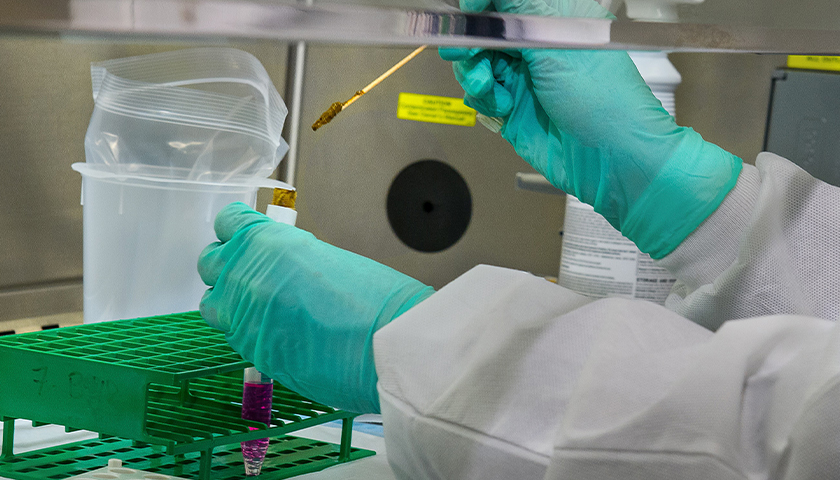by Debra Heine
The two Chinese scientists who were expelled from a high-security lab in Canada two years ago for “possible breaches of security protocols,” have allegedly disappeared amid an ongoing investigation.
The scientists, Xiangguo Qiu and her husband Keding Cheng, had their security clearances revoked, and were escorted from the lab after live Ebola, Henipah, and other deadly viruses were reportedly sent to the Wuhan Institute of Virology in China.
Bio Espionage Dr. Xiangguo Qiu, her husband Keding Cheng and her students from China were removed from Canada's only level-4 lab over what's described as a possible "policy breach." @CBCNews https://t.co/nUIt2EcQpf Origin of the #CoronaVirus #COVID19 https://t.co/Eryn40Si82 pic.twitter.com/SIRfs21RaD
— Aly-Khan Satchu (@alykhansatchu) June 15, 2020
Qiu was the head of the Vaccine Development and Antiviral Therapies section in the Special Pathogens Program at the National Microbiology Laboratory in Winnipeg, and Cheng was a Public Health Agency of Canada (PHAC) biologist.
On May, 24, 2019, two months after the deadly pathogens were sent to the Wuhan lab, the Public Health Agency of Canada (PHAC) referred an “administrative matter” to the Royal Canadian Mounted Police (RCMP) resulting in the removal of the two Chinese research scientists, and several international students.
They were removed from the lab in July of 2019. Qiu and Cheng were fired in January, 2021, and have not publicly commented on why they were fired.
Qiu played a key role in shipping the deadly Level 4 pathogens to China, according to the Globe and Mail.
Although the Public Health Agency of Canada insists all protocols were followed, documents show that the shipments lacked a standard “material transfer agreement” that spelled out intellectual-property rights.
Other troubling national-security issues involve the couples’ work with Chinese military scientists and access granted to students from China to the high-security lab.
Dr. Qiu was able to bring in graduate and postgraduate students from China, who were studying at the University of Manitoba, into the Level 4 lab. It remains unclear how those students got the security clearance to enter this lab, which is equipped to handle the world’s most dangerous viruses.
According to The Globe, “the couple and other scientists at the lab collaborated with Chinese military researchers to study and conduct experiments on deadly pathogens such as Ebola, Lassa fever and Rift Valley fever.”
The Globe reported that Feihu Yan, one of the researchers from the People’s Liberation Army’s Academy of Military Medical Sciences, actually worked for a period of time at the Winnipeg lab.
“The decision to grant access is made by the Public Health Agency of Canada,” CSIS spokesperson Keira Lawson said in an e-mail.
Conservative MPs passed a motion last week to obtain uncensored records on why the two scientists were fired.
The Liberal Canadian government has been tight-lipped about the situation, citing the sensitivity of the national-security matter as the reason for their lack of transparency.
The Conservatives, Bloc Québécois and NDP also want to know if the dismissals are related to possible espionage or the transfer of two highly dangerous viruses to the Chinese lab in Wuhan, the city where the coronavirus outbreak was first detected.
On Wednesday the Liberal government acknowledged the couples’ firing is related to sensitive national-security matters. For that reason, it says, it is ignoring the Commons motion and declining to provide the information to the special House of Commons committee on Canada-China relations. Health Minister Patty Hajdu says the government is only prepared to hand over classified documents to a different committee of parliamentarians that reports directly to Prime Minister Justin Trudeau.
“We will never jeopardize national security,” Ms. Hajdu told the Commons Thursday.
According to The Globe, the couple no longer live in Winnipeg, and may not even still be in Canada at this point.
The RCMP would not say if they know where they are located.
“As this is an ongoing investigation, we will not be providing any additional information,” Corporal Julie Courchaine from the RCMP’s Manitoba division said in an e-mail.
The couple own several properties, according to The Globe, including their principal residence valued at $1.2-million in a Winnipeg suburb, and a property in Winnipeg, valued at $524,000, which is rented to two international students from China. They also reportedly own a property in Gimli, Manitoba, and are rumored to own a home in China.
The Globe was unable to find anyone living at the couples’ principal residence, valued at $1.2-million, and located in the suburbs. A nearby neighbour, who did not want to be identified, said no one has been living at the residence for at least the past six months. A man comes periodically to check on the property, and to do a little yard work, the neighbour said.
A second property, valued at $524,000, is rented to two international students from China. The students did not give their names but told The Globe that they believe their landlords moved to Vancouver and had no idea if they would be returning to Winnipeg.
They said they had no e-mail or phone number for them and that they communicated with the couple and pay their rent through WeChat, the Chinese language social-media app.
Attempts to locate the couple in Vancouver were unsuccessful. The Globe e-mailed Dr. Qiu but she did not respond. Her husband did not accept a request to speak to The Globe through WeChat.
A former colleague of the couple said it’s his understanding that they own a home in China. He did not know where the home was located. The Globe is not identifying the colleague who did not want to speak publicly about his conversations with Dr. Qiu and Dr. Cheng.
Dr. Qiu has been a prolific researcher, co-authoring more than 120 scientific research papers between 2000 and 2021, often “in collaboration with Chinese scientists where research was funded by Chinese government bodies,” according to The Globe.
Other viruses Qiu exported to China reportedly include the Nipah virus, which is transmittable from animals to humans and “also able to jump between humans—it can cause acute breathing problems and encephalitis, potentially fatal brain inflammation,” as Tom Blackwell of Canada’s National Post explained.
In cases in Bangladesh and India, death rates ranged between 50 and 100 percent, so Nipah is also a “threat to cause a widespread outbreak and its potential for weaponization has increased.”
The Nipah virus, as Karen Pauls of the Canadian Broadcasting Corporation recalls, was one of the viruses Dr. Xiangguo Qiu, who hails from Tianjin, China, exported to the Wuhan Institute of Virology from Canada’s National Microbiology Laboratory (NML) in Winnipeg.
A former director of the Canadian Security Intelligence Service CSIS told the Globe that he couldn’t understand how potential Chinese spies were able to gain access to the Winnipeg lab.
“With the development over the past few years of more aggressive Chinese activity regarding the acquisition of Western science and tech information, it is very difficult to understand why PHAC and CSIS do not actively require full security clearances for appropriate lab staff as well as a comprehensive and up-to-date security policy to protect Canadian intellectual property developed at the Winnipeg laboratory,” said former CSIS director Richard Fadden.
Stéphane Bergeron, a Bloc Québécois member of the Canadian Parliament, expressed concern that the Chinese may have been collaborating with the Winnipeg lab for nefarious reasons.
“It seems we helped the Chinese military to develop their own capacity on biological warfare,” Mr. Bergeron said.
Conservative Leader Erin O’Toole on June 1, called for the release of unredacted documents regarding the transfer of Ebola and Henipah viruses to the Wuhan Institute of Virology in 2019. His motion also calls for the release of documents concerning the firing of Qiu and Cheng from the National Microbiology Laboratory in Winnipeg.
– – –
Debra Heine reports for American Greatness.





